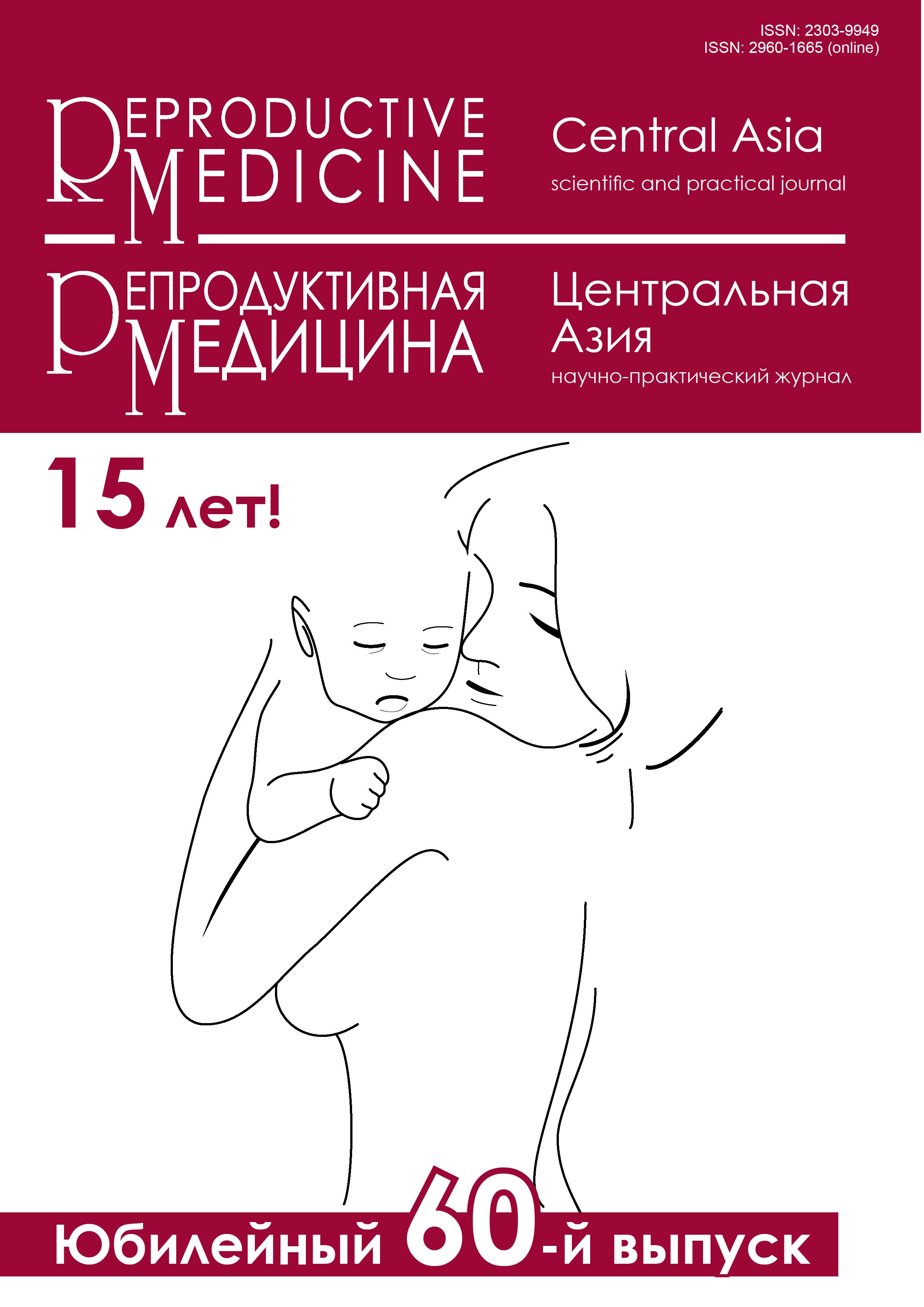Artificial Intelligence — a key to the development of embryology laboratory
DOI:
https://doi.org/10.37800/RM.3.2024.42-49Keywords:
artificial intelligence, embryos, developmental assessment, ploidy, blastocyst, preimplantation diagnosisAbstract
Relevance: Introducing artificial intelligence (AI) in assisted reproductive technologies (ART) is a relevant and exciting topic. While the potential success of AI is evident, there are still questions about its correctness that require the collective effort of our research community to address.
The study aimed to underscore the immense potential of using artificial intelligence to predict blastocyst yield, ploidy, and pregnancy frequency in assisted reproductive technology programs using noninvasive diagnostics. If harnessed, this potential could revolutionize the field of ART.
Materials and Methods: We conducted a cross-sectional retrospective study of 655 programs of married couples diagnosed with infertility. The patients were divided into 2 age groups: Group 1 – up to 38 years old, Group 2 – 39 years and older. The embryos were categorized into 2 groups based on the AI assessment on the 5th day of development: Group 1 with an evaluation of 0-5 points, and Group 2 – 6-10 points. According to the morphological quality, the embryos were divided into 2 groups: Group 1 – embryos with an assessment of excellent blastocyst quality ≥2BC according to Gardner, and Group 2 – blastocysts of good quality and below <2BC.
Results: We revealed a statistically significant moderate positive correlation between the AI assessment of embryos on the 5th day of development and the morphological quality of blastocysts. Prediction of a euploid embryo using AI reaches 90.9%. Regardless of the woman's age, embryos with a low AI score on the 5th day of development are statistically significantly less likely to result in pregnancy (p<0.001). The sensitivity of the obtained model was 79.6%, and the specificity was 47.1%.
Conclusion: The obtained results demonstrate the high potential for artificial intelligence to increase the effectiveness of ART programs' outcomes, including as a non-invasive preimplantation diagnosis. Further study of the possibilities of using artificial intelligence in ART clinics is necessary.
References
Salih M, Austin C, Warty RR, Tiktin C, Rolnik DL, Momeni M, Rezatofighi H, Reddy S, Smith V, Vollenhoven B, Horta F. Еmbryo selection through artificial intelligence versus embryologists. Human Reproduction Open. 2023;2023(3).
https://doi.org/10.1093/hropen/hoad031
Diakiw SM, Hall JMM, Vermilyea MD, Amin J, Aizpurua J, Giardini L, Briones YG, Lim AYX, Dakka MA, Nguyen TV, Perugini D, Perugini M. Development of an artificial intelligence model for predicting the likelihood of human embryo euploidy based on blastocyst images from multiple imaging systems during IVF. Human Reproduction. 2022;30;37(8):1746-1759.
https://doi.org/10.1093/humrep/deac131
Chavez-Badiola A, Flores-Saiffe-Farías A, Mendizabal-Ruiz G, Drakeley AJ, Cohen J. Embryo Ranking Intelligent Classification Algorithm (ERICA): artificial intelligence clinical assistant predicting embryo ploidy and implantation. Reprod Biomed Online. 2020;41(4):585-593.
https://doi.org/10.1016/j.rbmo.2020.07.003
Zegers-Hochschild F, David Adamson G, Dyer S, Racowsky C, De Mouzon J, Sokol R, Rienzi L, Sunde A., Schmidt L, Cooke ID, Simpson JL, Van der Poel S. The International Glossary on Infertility and Fertility Care. Human Reproduction. 2017;32(9):1786-1801.
https://doi.org/10.1093/humrep/dex234
Gardner DK, Balaban B. Assessment of human embryo development using morphological criteria in an era of time-lapse, algorithms and 'OMICS': is looking good still important? Molecular Human Reproduction. 2016;22(10):704-718.
https://doi.org/10.1093/molehr/gaw057
Desai NN, Goldstein J, Rowland DY, Goldfarb JM. Morphological evaluation of human embryos and derivation of an embryo quality scoring system specific for day 3 embryos: a systematic review. Human Reproduction Update. 2014;20(3):413-426.
https://doi.org/10.1093/humrep/15.10.2190
Tran D, Cooke S, Illingworth PJ, Gardner DK. Deep learning as a predictive tool for fetal heart pregnancy using electronic health records. Human Reproduction. 2019;34(6):1011-1018.
https://doi.org/10.1093/humrep/dez064
Khosravi P, Kazemi E, Zhan Q, Toschi M, Malmsten JE, Hickman C, Meseguer M, Rosenwaks Z, Elemento O, Zaninovic N, Hajirasouliha I. Robust automated assessment of human blastocyst quality using deep learning. NPJ Digit Me. 2019;2:21.
https://doi.org/10.1038/s41746-019-0096-y
Curchoe CL, Bormann CL. Artificial intelligence and machine learning for human reproduction and embryology. J Assistant Reproduction Genetics. 2019;36(4):591-600.
https://doi.org/10.1007/s10815-019-01408-x
Zaninovic N, Rosenwaks Z. Artificial intelligence for embryo assessment: a perspective on the commercial application of this technology in IVF. Fertility and Sterility. 2021;42(1):5-15.
https://doi.org/10.1016/j.fertnstert.2020.09.157
Fruchter-Goldmeier Y, Kantor D, Ben-Meir A, Wainstock T, Erlich I, Levitas E, Shufaro Y, Sapir O, Har-Vardi I. An artificial intelligence algorithm for automated blastocyst morphometric parameters demonstrates a positive association with implantation potential. Scientific Reports. 2023;13(1):14617.
https://doi.org/10.1038/s41598-023-40923-x
Kragh MF, Karstoft H. Embryo selection with artificial intelligence: how to evaluate and compare methods? J Assistant Reproduction Genetics. 2021;38(7):1675-1689.
https://doi.org/10.1007/s10815-021-02254-6
Wang X, Wei Q, Huang W, Yin L, Ma T. Can time-lapse culture combined with artificial intelligence improve ongoing pregnancy rates in fresh transfer cycles of single cleavage stage embryos? Front Endocrinol. 2024;29(15):1449035.
Downloads
Published
How to Cite
Issue
Section
License
Copyright (c) 2024 The rights to a manuscript accepted for publication are transferred to the Journal Publisher. When reprinting all or part of the material, the author must refer to the primary publication in this journal.

This work is licensed under a Creative Commons Attribution-NonCommercial-NoDerivatives 4.0 International License.
The articles published in this Journal are licensed under the CC BY-NC-ND 4.0 (Creative Commons Attribution – Non-Commercial – No Derivatives 4.0 International) license, which provides for their non-commercial use only. Under this license, users have the right to copy and distribute the material in copyright but are not permitted to modify or use it for commercial purposes. Full details on the licensing are available at https://creativecommons.org/licenses/by-nc-nd/4.0/.





